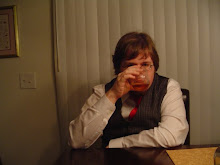Death is the seed from which I grow.
I will admit it, Burroughs is my favorite Beat. Kerouac has a beautiful, lackadaisical melancholy to him, Ginsberg resonates with the nerves and shaking coils of the cosmos (or at least he did for a staggeringly brief period between 1950 and 1960), but William S. more than any of them accomplished that most lofty of Beat ideals, the complete disposal of the corpse of language by acid-bath and its replacement with a doppelganger who, despite a strong resemblance to the poor victim, is fundamentally wrong on some level.
Right: Burroughs and oh my god why do people still let him have GUNS?
I read Naked Lunch when all red-blooded men should, my first year at college. It was gripping, fascinating, beautifully vulgar and disgusting and adventurous, although Burroughs' own personal obsessions-- predominantly underage gay sex --occasionally veer from interesting to obnoxious in their frequency. I read snippets of Ah Pook in high school, and thought that it wasn't that great; the meditations on death and life and Mayan myth were interesting enough, but I wasn't prepared for the lack of narrative drive. I read Junky at the same time and agree with Harvey Pekar's assertion that it holds up amazingly well; it's not Burroughs at his incendiary, obscene brilliance, but it's a fantastic portrait of his times and habits. And then in quick succession earlier this year I saw Cronenberg's Naked Lunch movie (a wonderfully incisive look into the mental Interzone that Burroughs inhabited while writing his most famous work, and the man who plays Ginsberg is dead-on prfect) and read Graham Caveney's Gentleman Junkie (which is not especially deep but is a beautifully-made book, and the fact that Chapter 5 has its margins lined with handguns is wonderful), and they both rekindled my interest in the man.
I recently started rereading Naked Lunch, and am reminded that I had forgotten the incredible amount of fun it is. The sardonic, faux-noir opening (I am evidently his idea of a character is a wonderful line), the boiling down of of Burroughs' spiritual war and the forces that surround him into the corporate competition of Interzone, Islam Inc., and Annexia, and the simple joy with words that pervades it (other smells curled through pink convolutions, touching unknown doors proves that, while he may have talked about smashing, dissasembling, and assassinating the English language, Burroughs knew how to use it)-- there's a sense of adventure and fun here that shows that, dspite his dark and nihilistic focus, Burroughs' dispostion never differed too much from Jack or Allen.
He may have been the most sinister (especially in Tangiers) of the three, but there's a sense of hope to his work at well, an exubeant freedom and revelment in the depths of it. Naked Lunch doesn't attempt a revolution, it's a missive from the already-freed lands, showing the rest of us how good it can be without those pesky laws or human decency. This isn't to say that it's a friendly book-- Cronenberg commented that a literal film adaptation would be banned in every country --but it's not a scream of loathing or rage a la Irvine Welsh (nothing against Mr. Welsh, as he may rank below Alasdair Gray as Scotland's foremost modern literary talent). Burroughs didn't trangress the laws so mch as he transmigrated into a world where they no longer existed, or transfigured them into something that would no longer apply to him. If the driving spirit of the Beat movement can be called freedom or, more stuffily, the assertion of the inividual, then it's Bill Burroughs, Junkie, Queer, and wife-killer, who it seems found it in its purest form




No comments:
Post a Comment